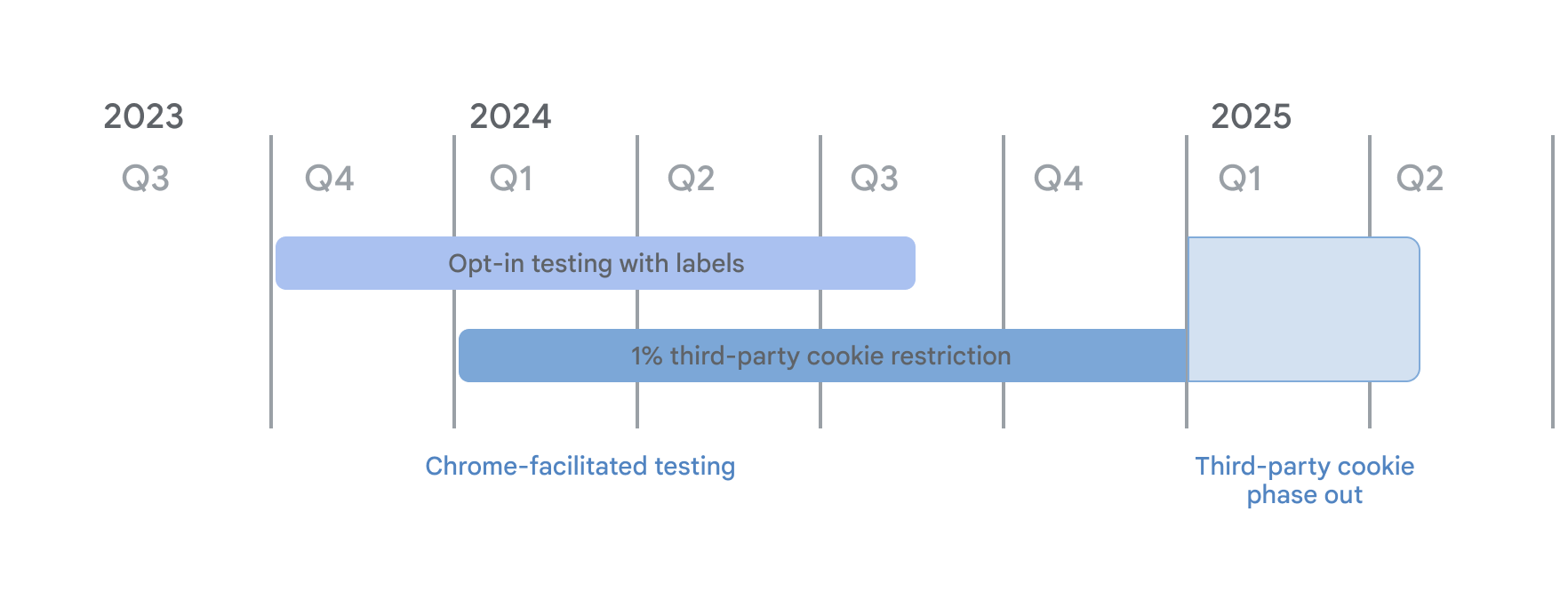
Prepare for third-party cookie restrictions
To facilitate testing, Chrome has restricted third-party cookies by default for 1% of Chrome Stable clients and 20% of Canary, Dev and Beta clients. During this testing period, it is important for sites and services to start preparing for third-party cookie restrictions, including moving to more private alternatives. Subject to addressing any remaining competition concerns of the UK's Competition and Markets Authority, we envision proceeding with third-party cookie deprecation starting in early 2025.
Understand third-party cookie phaseout
Learn more about the timeline of third-party cookie deprecation and understand what actions you need to take to preserve your site's functionalities.
Audit your use of cookies
Review your cookies and make a list of those cookies for which you will need to take action to ensure they keep functioning properly.
Test for breakage
Set up Chrome to block third-party cookies and enable new functionality and mitigations to simulate the state after the phase out.
Migrate to privacy preserving solutions
Once you have identified the cookies with issues and you understand the use cases for them, you can work through the following options to pick the necessary solution.
CHIPS
The new cookie attribute, Partitioned, allows developers to opt a cookie into partitioned storage, with separate cookie jars per top-level site.
Storage Access API
Storage Access API allows iframes to request storage access permissions when access would otherwise be denied by browser settings.
Related Website Sets
Related Website Sets (RWS) is a way for a company to declare relationships among sites, so that browsers allow limited third-party cookie access for specific purposes.
Federated Credential Management API
A web API for privacy-preserving identity federation.
Guides for common workflows
Understand how to test common workflows that may rely on third-party cookies and decide on which privacy-preserving alternatives to migrate to.
Identity guide
Find recommended solutions for sign-in scenarios likely to be affected by third-party cookie restrictions.
Embed guide
Test for embed-related journeys that rely on third-party cookies, and learn how to choose between the privacy-preserving alternatives.
Temporary exceptions
Cross-site cookies have been a critical part of the web for over a quarter of a century. This makes any change, especially a breaking change, a complex process that requires a coordinated and incremental approach. As with many previous deprecations on the web, we understand there are cases where sites need extra time to make the necessary changes and preserve critical user experiences.
First-party deprecation trial
If your first-party site relies on third-party embedded services and third-party cookie deprecation has caused functionality on your website to break, you may be eligible for the first-party deprecation trial.
Third-party deprecation trial
If you are a third-party service provider and third-party cookie deprecation has caused your embeds and service functionalites to break, you may be eligible for the third-party deprecation trial.
Heuristics based exceptions
Learn more about temporary heuristics based exceptions.
Enterprise support
Learn more about Chrome Enterprise policies for third-party cookies.
Cookie Countdown
Learn about the latest milestones on the way to phasing out third-party cookies.
Request additional migration time with the third-party cookie deprecation trial
For an easier transition through the deprecation process, we are offering a third-party deprecation trial which allows embedded sites and services to request additional time to migrate away from third-party cookie dependencies for non-advertising use cases.
Preparing for third-party cookie restrictions
If your site uses third-party cookies, it's time to take action. To facilitate testing, Chrome has restricted third-party cookies by default for 1% of users. Subject to addressing any remaining competition concerns of the UK's Competition and Markets Authority, we envision proceeding with third-party cookie deprecation starting in early 2025.
Related Website Sets - the new name for First-Party Sets in Chrome 117
In this post, we introduce Related Website Sets (RWS)—our new name for FPS that better reflects its purpose—and provide a refresher on key use cases along with an update on the associated subset domain limit.
Report issues with third-party cookies and get help
We want to ensure we capture the various scenarios where sites break without third-party cookies to ensure that we have provided guidance, tooling, and functionality to allow sites to migrate away from their third-party cookie dependencies. If your site or a service you depend on is breaking with third-party cookies disabled, you can submit it to our breakage tracker.
